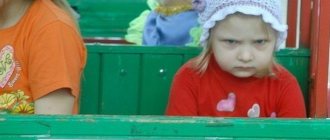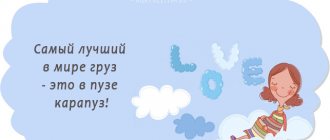The famous Ukrainian teacher Vasily Sukhomlinsky was and remains one of the brightest figures in pedagogy, psychology and literature. His legacy: methodological works, research, stories, fairy tales - are valuable primarily for their clear presentation of thoughts and vivid imagery. He touched upon the most pressing aspects of education and training, which are as relevant today as they were half a century ago. This year marks the 100th anniversary of the birth of Vasily Alexandrovich. He revealed simple truths to parents and teachers, without which it is impossible to understand and accept the world of childhood, and taught them to value “your inner child”:
Only he can become a real teacher who never forgets that he himself was a child.
Being a teacher is a huge responsibility.
Innovative teacher Vasily Sukhomlinsky argued that the most important thing in the profession of a teacher, in the role of a mentor, is not to extinguish that light in a child that is inherent in nature: inquisitiveness, curiosity, imaginative thinking, a desire to learn new things. It is important not to “strangle” the child with the flow of knowledge, not to extinguish the desire to learn, think, and explore.
Children don’t need to talk a lot, don’t stuff them with stories; words are not fun, but verbal satiety is one of the most harmful satiations. The child needs not only to listen to the teacher’s word, but also to remain silent; in these moments he thinks, comprehends what he heard and saw. Children should not be turned into passive objects of perception of words. And in the midst of nature, the child must be given the opportunity to listen, look, feel.
The essence of teaching, according to Sukhomlinsky, is to interest, surprise, force a response, encourage thinking, reasoning, and searching for the right answers. The school must adhere to the principles of humanism in reality, and not nominally. To be fair, responsive, empathetic, take responsibility, not to be indifferent - this is the basis of humanity. Sukhomlinsky’s quote about the teacher sounds wise and relevant:
A teacher can be fair if he has enough spiritual strength to pay attention to each child.
V. Sukhomlinsky defines the work of a teacher as “human studies” - a very subtle, changeable area in which you need to be as attentive, honest, open and consistent as possible. In the book “One Hundred Advice to a Teacher”, the teacher gives invaluable testaments to those who have decided to connect their life with raising a real person.
Dry knowledge will not bear fruit
In a natural history lesson, it is more useful to go on an excursion to the forest than to retell the chapters of the textbook. A descriptive essay, preparation for which takes place in the autumn park, will probably be more successful than vocabulary work at a desk at school. It is impressions that give impetus to the thirst for knowledge, to creativity.
Thinking begins with surprise!
This simple pattern is revealed by Vasily Alexandrovich in his book “I Give My Heart to Children.”
Separating the process of upbringing and education from real life is as stupid as teaching someone to swim without water. Modern education is guilty of this, but the connection between theory and practice in teaching is absolutely natural.
In order not to turn a child into a repository of knowledge, a storehouse of truths, rules and formulas, we must teach him to think. The very nature of children's consciousness and children's memory requires that the bright surrounding world with its laws not be closed off for a minute.
Sukhomlinsky emphasized the importance of the traditions of folk pedagogy - it is intuitive and wise. The role of the father and mother in raising a child is the most important. Nothing compares to the values instilled in a family, the knowledge gained with love and care.
Sukhomlinsky spoke about school as the most important stage in the formation and development of a child. If at this stage the child encounters injustice, callousness, indifference, cognitive interest will be lost, and it is very difficult to restore trust in adults.
Heart given to children
Sukhomlinsky’s quotes about education are a storehouse of wisdom and simple truths that every parent and teacher needs to know.
The child is a mirror of the moral life of the parents. The most valuable moral trait of good parents, which is passed on to children without much effort, is the spiritual kindness of the mother and father, the ability to do good to people.
No matter how hard teachers try to instill in children culture, values and educate them based on the best traditions, the family is the beginning of everything, its role is stronger and more significant.
Children should live in a world of beauty, games, fairy tales, music, drawing, fantasy, and creativity.
Sukhomlinsky’s quotes about the nature of a child are vital, relevant, time-tested:
A child cannot live without laughter. If you have not taught him to laugh, joyfully surprised, sympathetic, wishing well, if you have not been able to make him smile wisely and kindly, he will laugh evilly, his laughter will be a mockery.
Sukhomlinsky noted the importance of emotions in raising and teaching a child more than once. This is the basis of everything, the key to success in the hard work of teachers and parents.
Quotes from V. A. Sukhomlinsky
The great evil is greed. A selfish person cannot be truthful, nor principled, nor courageous, nor faithful to his duty. From an early age, learn to live selflessly. Greed, selfishness
Stinginess impoverishes a person, turns him into an egoist and an acquirer. Greed, selfishness
Things exist to serve man, not to enslave him. Greed, selfishness
In marriage, mutual education and self-education do not stop for a minute. Marriage, family
In family life, one must take into account the thoughts, beliefs, feelings, and aspirations of a loved one. While maintaining your dignity, you must be able to give in to each other. Marriage, family
The main meaning and purpose of family life is raising children. The main school for raising children is the relationship between husband and wife, father and mother. Marriage, family
The family is the primary environment where a person must learn to do good. Marriage, family
Without the purity of intimate feelings, the purity of civil feelings is unthinkable. Loyalty, constancy
Idleness in class, lack of mental work where it should be, is the main reason for the lack of free time. Education and educators
Teaching is just one of the petals of that flower called education. Education and educators
Selfishness is the root cause of cancer of the soul. Arrogance, vanity, ambition, selfishness
A person in love with himself cannot be capable of true love. Selfishness is a terrible vice that poisons love. If you are selfish, it is better not to start a family. Arrogance, vanity, ambition, selfishness
To think only about yourself, only about your own good, means to be a beast. Arrogance, vanity, ambition, selfishness
Only those who respect other people have the right to respect. Pride, dignity, self-respect
Spiritual wealth is unthinkable without self-esteem. Pride, dignity, self-respect
Manhood consists, in part, of not being a freeloader. Pride, dignity, self-respect
Without self-respect there is no moral purity and spiritual wealth of the individual. Self-respect, a sense of honor, pride, dignity - this is the stone on which the subtlety of feelings is honed. Pride, dignity, self-respect
Only those who cannot pass indifferently past the joys and sorrows of an individual are capable of taking the joys and sorrows of the Fatherland to heart. Kindness, philanthropy
Man rose above the world of all living things primarily because the grief of others became his personal grief. Kindness, philanthropy
True humanity means, above all, justice. Kindness, philanthropy
Where there is rigor and exactingness of a woman or girl, the young man becomes a real man. Women, men
A person only truly values life when he has something immeasurably more valuable than his own life. Life
We must fight against evil. Evil is intolerable. To come to terms with evil means to become an immoral person yourself. Malice, cruelty, meanness
An unreasonable, cold, indifferent word can offend, hurt, upset, cause confusion, shock, and stun. Backbiting, quarrelsomeness
Art is a time and space in which the beauty of the human spirit lives. Just as gymnastics straightens the body, so art straightens the soul. By learning the values of art, a person recognizes the human in man and raises himself to the level of beauty. Art
A book is one of the most important sources of joy in thinking. Book, print
Reading is work, creativity, self-education of your spiritual strength and will. Book, print
Genuine self-criticism is the voice of conscience. Criticism
The great evil is hypocrisy, servility, opportunism. Know how to recognize this many-sided evil, be intolerant and irreconcilable towards it. Flattery, hypocrisy, hypocrisy
Love is not only enthusiastic admiration, enjoying the beauty created for you, but also the endless creation of beauty in your loved one. Love
Moral ignorance and savagery in the sphere of love bring great harm to our society. He who considers love only pleasure gives birth to grief, unhappiness, and tears. Love
True love is born only in a heart that has experienced concerns about the fate of another person. Love
Without searches and discoveries, and therefore without exertion of effort, passion and inspiration are unthinkable. Dreams, wishes, hopes
Beliefs by their very nature cannot be inactive spiritual wealth. Worldview, ideals, principles, beliefs
The most difficult thing is the courage of everyday, long-term work. Find yourself an ideal of courage and follow it relentlessly. Courage, heroism, valor
Music unites the moral, emotional and aesthetic spheres of a person. Music is the language of feelings. Music
Music is a powerful source of thought. Without musical education, full mental development is impossible. Music
Just as gymnastics straightens the body, so music straightens the human soul. Music
The first civic feeling is the feeling of the creator of material wealth, without which human life is impossible. People, state, nation
Ignorance, wretchedness of mind and feelings are becoming moral vices these days. Ignorance
There can be no communist morality without basic humanity. Morality, morality
The wealth of a society is made up of the diversity of its constituent individuals, because the highest goal of education is the person himself. Society, classes, team
Caring for the educational power of the team is caring for the spiritual enrichment and growth of each member of the team, for the richness of relationships. Society, classes, team
The team is not some faceless mass. It exists as a wealth of individuals. Society, classes, team
A person cannot live alone. The highest human happiness and joy is communication with other people. Society, classes, team
A person is what he becomes when left alone with himself. The true human essence is expressed in him when his actions are driven not by someone, but by his own conscience. Behavior, actions
Love for the Fatherland and love for people are two fast streams that, merging, form a mighty river of patriotism. Motherland, patriotism
Children should live in a world of beauty, games, fairy tales, music, drawing, fantasy, and creativity. Parents, children
If people say bad things about your children, that means they are saying bad things about you. Parents, children
Any worker - from a watchman to a minister - can be replaced by an equally or even more capable worker. It is impossible to replace a good father with an equally good father. Parents, children
Many troubles have their roots precisely in the fact that from childhood a person is not taught to control his desires, he is not taught to correctly relate to the concepts of what is possible, what is necessary, and what is not. Parents, children
The child hates the one who hits. Parents, children
Man has three disasters: death, old age and bad children. No one can close the doors of their house from old age and death, but the children themselves can protect the house from bad children. Parents, children
A clear understanding and strict observance of your duty to people is your true freedom. The more humanely and consciously you observe your duty to people, the more you draw from the inexhaustible source of true human happiness - freedom. Freedom, equality
The feeling of guilt is a noble feeling of a well-mannered person. Only a fool and a dense moral ignoramus does not experience guilt. Conscience, honor
The feeling of guilt is not self-flagellation, but remorse, the desire for moral purity and decency. Conscience, honor
Reporting to your conscience is incomparably more difficult than reporting to another person. If you do something bad alone with yourself and think that no one will know about it, you are mistaken. Hiding from people is baseness, hiding from oneself is baseness multiplied by meanness and hypocrisy. Be completely honest with yourself. Conscience, honor
The most beautiful and at the same time the happiest people are those who lived their lives caring for the happiness of others. Happiness joy
The highest personal happiness is to fight for something greater than personal interests. Happiness joy
A person is what his idea of happiness is. Happiness joy
Old age cannot be happiness. Old age can only be peace or disaster. She becomes at peace when she is respected. What makes her miserable is oblivion and loneliness. Physical Culture
Place 100 teachers over you - they will be powerless if you cannot force yourself and demand from yourself. Character, endurance, self-control
Shouldness is the main source of will. Character, endurance, self-control
Each person is the creator of his own well-being. A person is what his idea of happiness is. Person people
Quotes from Sukhomlinsky about punishment
To hit or not to hit? This question has always worried thinking parents. Vasily Alexandrovich always spoke out against such measures:
Do not allow physical coercion to be used against your child. There is nothing more harmful and sinister than “strong”, strong-willed means. A strap and a slap on the head instead of a smart, affectionate, kind word is a rusty ax instead of a fragile, delicate, sharp sculptor’s chisel. Physical punishment is violence not only against the body, but also against the spirit of a person; the strap makes not only the back, but also the heart and feelings insensitive.
If punishment is necessary, then it is worth creating a situation where the child can look inside himself, understand and be ashamed of the offense.
No matter how serious a child’s offense may be, if it is not committed with malicious intent, it should not be punished.
It is useful for a child to engage in physical labor; it builds will and character. Rarely does a child break norms intentionally. Children make mistakes, they have the right to do so.
The one who is being beaten wants to be beaten himself. Anyone who wants to hit as a child will want to kill as an adult. Crimes, murders, violence have their roots in childhood.
Many more wise words were said by the great teacher in defense of the child - a little person who has the right to childhood.
Quotes about raising children in school
***
The school must, first of all, have a high speech culture, an atmosphere of great sensitivity to the word must reign: what is said or written incorrectly should sound not only to the teacher, but also to the student, with the same dissonance as a false note to a person with a high ear for music. A piece of advice should be given to primary school teachers: educate children to be sensitive to the emotional connotation of words...
***
By shouting, teachers raise adult screamers, indifferent to people, heartless.
***
A teacher only becomes an educator when he has in his hands the most subtle instrument of education - the science of morality, ethics.
***
The teacher's scream stuns and deafens the child. Children who are often shouted at lose the ability to perceive the subtlest shades of other people's feelings and - this is especially alarming - lose sensitivity to truth and justice. Screaming drowns out and dulls the voice of a child's conscience. In a cry, children feel the confusion and powerlessness of the one who screams. They perceive the cry as one of two things - either an attack on them, the students, or protection from them, fear, fear. Both of these provoke a reaction of active protest.
To cultivate in a child’s heart truly human love, anxiety, worry, concern, and concern for the fate of another person.
A burning word from a hundred years ago
His works in the field of pedagogy have not lost their significance, perhaps because they were never oversaturated with ideology. Homeland, family, friendship, caring for one’s neighbor, justice, self-esteem - such concepts cannot lose their relevance. If modern education were built on the basis of the golden principles of pedagogy of the 20th century, and did not pursue new technologies, it would not drown out children’s interest in learning, but would stimulate knowledge and diversified development.
Success in learning is a path leading to that corner of a child’s heart in which the flame of the desire to be good burns.
This is the key to everything. A modern child is forced to be successful, but this is a heavy burden.
Sukhomlinsky’s quotes about school, education, love and duty are the most valuable material for those who seek to understand the nature of a child, his inner world and the secrets of the correct approach to upbringing and learning. A little person is a person, she is valuable in her own right. Adults must protect the child’s inner world and promote his full development.
Quotes about parenting in life
***
At every step in front of a child, a teenager, a young man, there is a stone that can be bypassed, but you can also remove it from the road, freeing it for other people and clearing the path to your own conscience.
***
You can become an engineer in 5 years, but you need to study to become a person all your life.
***
There should be no people who are invisible, no people who are unknown specks of dust. Each one should sparkle, just as billions of billions of Universes sparkle in the sky. To be a unique person depends largely on the individual himself. We must strive to avoid being gray and invisible.
***
The most important and most difficult thing for a person is to always, in all circumstances, remain human.
***
The moral character of an individual depends on the sources from which a person drew his joys during childhood. If the joys were thoughtless, consumerist, if the child did not learn what grief, resentment, suffering are, he will grow up to be an egoist and will be deaf to people. It is very important that our students learn the highest joy - the joy of exciting experiences caused by caring for a person.
***
If good feelings are not cultivated in childhood, you will never cultivate them, because this truly human thing is established in the soul simultaneously with the knowledge of the first and most important truths, at the same time with the experience and feeling of the subtlest shades of the native word. In childhood, a person must go through an emotional school - the school of instilling good feelings.
***
The art and skill of education is to ensure that not a single stone is left unturned, so that a person’s conscience does not give him peace if a soft, at first glance harmless creature, whose name is laziness, stirs in his soul.
***
Labor is, first of all, an area of children’s emotional life. A child strives to work when work gives him joy.
***
Pampered and dissolute individuals are formed when their lives are dominated by the only joy - the joy of consumption.
***
Emotional memory plays a huge role in sensory knowledge of the world in early childhood. Numerous facts convince us that, having deeply experienced a particular image and its beauty in early childhood, children remember it for the rest of their lives.
***
Experience shows that good feelings should be rooted in childhood, and humanity, kindness, affection, goodwill are born in work, worries, worries about the beauty of the world around us.
***
If a little person has not left pieces of his heart in a doll, a horse, a teddy bear, a bird, a tender and defenseless flower, a tree, or in a favorite book, then a deep feeling of human friendship, fidelity, devotion, and affection is inaccessible to him.
No matter how serious a child’s offense may be, if it was not committed with malicious intent, it should not be punished.








